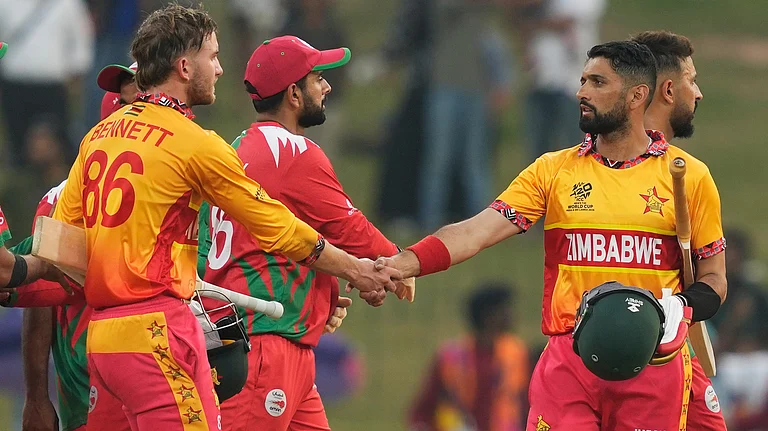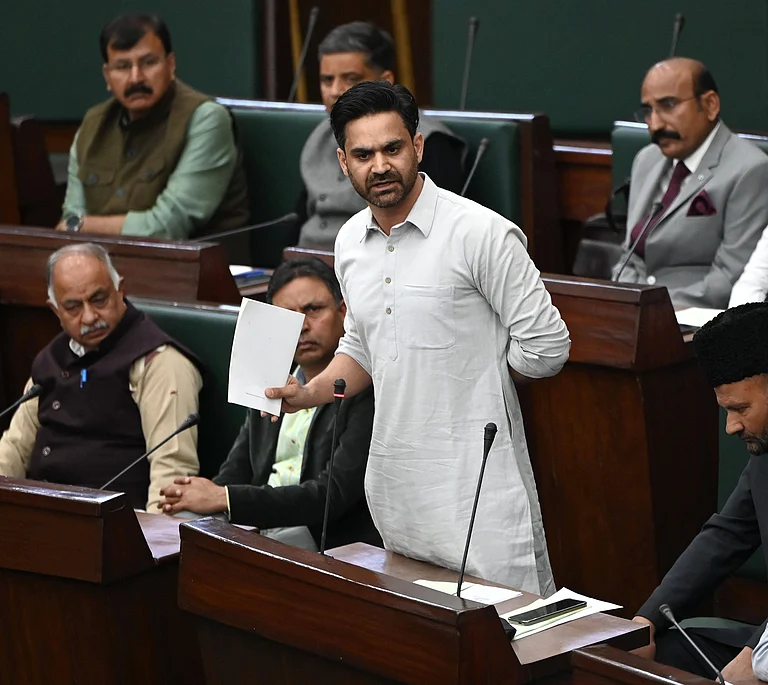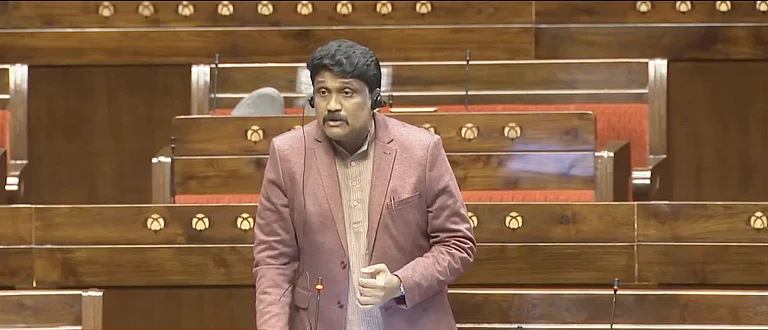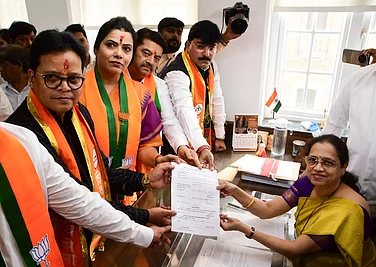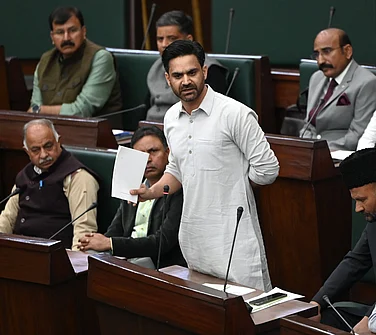For the past few days I have been preoccupied in one part of my mind in dealing with two reasons for anguish. The first reason has to do with the profound sense of disappointment and anger with which I heard Prof Ashis Nandy, a man I consider to be a great teacher, friend and in possession of one of the finest minds of our time, commit himself in public to a flippant and vulgar position when speaking of the relationship between caste and corruption at the Jaipur Literary Festival.
I was saddened because Prof Nandy’s statements do a great disservice to the suppleness and ethical integrity of his thinking, and represent one of those sadly paradoxical situations where an intellectual can become their own worst adversary. I am unambiguously critical of the Nandy who chooses to be pompously opinionated and misinformed at a forum like the Jaipur Literary Festival or while riding the hot-air currents of television especially because I remain a partisan of the Nandy who can be (when he chooses to be) one of the most thoughtful and insightful witnesses to our time in his writing.
The second reason for my anger has to do with the knee jerk reactions that have followed this episode, calling for Nandy’s prosecution and imprisonment, that come laden either with a disturbing sense of authoritarian rectitude emanating from the foot soldiers of identity politics and brokers of victimhood or with a degree of schadenfreude from intellectual charlatans.
In all honesty, I cannot deny that Nandy’s remarks at the Jaipur Literary Festival reflect a profound lapse of judgement. As a person who claims to be a student of psychology among other things, I would urge Prof Nandy, out of the solidarity and respect that I have for him to do some honest introspection and think about the conscious and unconscious habits of thought and affect that so speedily bring an invocation of caste, even when it is not immediately relevant, to the lips of our intellectuals. Corruption is a question of an unregulated access to power, or, a measure of the way in which the absence of a sustainable wage makes it necessary for millions of ordinary people to pursue informal economies and ways of life outside of or on the fringes of legality. A meditation on neither of these two polar phenomena necessarily requires us to weigh in on the caste identities of those who corrupt, or are corrupted by the ordinary operations of power and the economy in our society.
To say that ‘most of the corrupt are Dalits or come from backward communities’ is to say something as nonsensical as ‘most terrorists are Muslim’, or, ‘most people in the top echelons of right wing Hindu groups are Chitpavan Brahmins’ or ,’most of the financiers and speculators in global Capitalism are Jewish’, or ‘most of the people who were carriers of the HIV virus in the early days of the AIDS epidemic were homosexuals’.
First of all, such statements are of extremely dubious empirical value. They reflect the prejudice of the speakers and the spoken to more than they mirror facts on the ground. Secondly, even if they were to contain a modicum of truth—‘yes, some of those caught for corruption have been Dalits, yes, some of those found guilty of terrorism are Muslim, yes, some of those who were early carriers of the HIV were gay, and yes, some of the leading plutocrats are Jewish and some of those involved in right wing Hindu fascism are Marathi speaking Brahmins’ stating them in bald terms necessarily involves the assertion of a falsehood, simply because there are always more counter factual instances that disprove each of the above assertions. For each X that is why Y ( here, for X, read an identity category—Dalit, Muslim, Gay, Jew, Brahmin etc. and for Y read an attribute—corrupt, terrorist, disease carrier, plutocrat, fanatic), there are way too many Xs that are also not Y for any correlation between X and Y to be meaningful. In fact no statements of this kind, or pretences to facticity of this nature actually tell us anything valuable about corruption, terrorism, AIDS, finance capital, or Hindutva, or for that matter, about Dalits, Muslims, Jews, Gays or Brahmins.
They reflect instead a habit of inexactitude and imprecision that is indulged in Indian intellectual life, based on the easy anecdote, idle prejudice and plain statistical dissimulation, and deployed, casually, in passing as the currency of opinion, in may I add, largely male homosocial gatherings, where no one actually challenges anyone else. It reflects the sad fact that the mainstream of Indian intellectual life has not yet learnt to think beyond, below or besides identity based categories.
With regard to a discussion of corruption, the question of caste has a relevance insofar as the informally expressed networks of power and privilege are concerned, through which corruption operates—nepotism, for instance, in a specifically Indian context has to be read in terms of caste, because of the relationship between kinship, the closed structure of many affinity groups and affinal ties and caste structures in India. This is perhaps the territory that Ashis Nandy intended to step into when he began talking about corruption at the Jaipur Literary Festival. But a consideration on the matrix of privilege, informality and familiarity that comes with an assessment of how the wheels of corruption are greased—which is best represented by Nandy’s remark gesturing towards how elites reward and protect their own (which in all fairness cannot be read in an ‘anti-Dalit’ manner) does not necessarily translate into a quantitative assessment of which caste embodies how much corruption. That leap, I am afraid, takes us straight into a habitual, reflexive cast of thought that cannot articulate itself in terms other than those of caste. That intellectual failure, the rush to make a sweeping statement about millions of people, their intents, actions and motives is what disappoints me. If anything, a serious consideration on kinship, influence, caste and corruption would show that there is not a single caste, community, old boys network, professional sector, affinity group or vocation that is free of corruption in India. To single out any particular group or identity, for the purposes of a conversationally discursive rhetorical flourish, is to be utterly deluded, and to provide fuel to the purveyors of prejudice, even when the person doing so may not be prejudiced themselves.
The political theory that emanated from CSDS may well have said important things about the relationship between caste and electoral politics in parts of north India in the latter half of the 20th century, but to have caste become the inevitable conceptual short-hand for any random feature of social, political or cultural life in India, shows us what happens when the contingent results of time bound quantitative surveys become intellectual fetishes that can be used to talk about any and everything in the name of a faux and au-fait indigeneity. Nandy’s profound error is not his alone, he is only the canary who sings in a predictable monotone as the conceptual mine shaft around him begins to cave in on itself. Perhaps there is no coal left in this particular seam.
What is particularly distressing to me is the fact that Nandy is actually at his best when he offers us the intellectual tools that help us critique the cults of empiricism, expertise and scientism. He is at his best when he speaks in riddles, enigmas and allegories. To see him pillory his own method at the altar of a vocabulary of ‘facts’ and ‘data’ is to see Nandy become the caricature of what he has most relentlessly criticised. Again, he is not alone in this. Great minds fall from great heights, and they fall hard. Let us not forget Martin Heidegger’s sinister Nazi period, Michel Foucault’s enthusiasm for the venality of the Islamist revolution in Iran, Hannah Arendt’s alleged abandonment of her principled anti-Zionism for the sake of a bizarre celebration (late in her life, and in private) of the military prowess of the Israeli state, Alexander Solzhenitsyn’s anti-Semitism and Jean Paul Sartre’s disgusting apologetics for Stalinism. We need not be blind to any of this when we read and learn from the work of these intellectuals and writers, nor do we need to be blinded by it. Intellectuals are not infallible, and there is no need for us to be incredulous when an intellectual that we otherwise admire succumbs to an ethical or cognitive lapse that we cannot, and indeed must not ignore.
A robust commitment to the principles of free speech can reconcile trenchant intellectual disagreement with a passionate embodiment of the ethical defence of the liberty of that with which one disagrees. I am prepared to argue strongly in favour of the freedom of speech of those who are my bitter intellectual and ideological adversaries, not because I think they are all wonderful people but because I think we are left poorer as a society when we do not make room for contrarian points of view (even when they are profoundly disagreeable). I strongly believe we need to consign every single law in the statute that restricts the freedom of speech, whether on the grounds of offended religious sensibilities, caste sentiments or the sanctity or security of the state to the garbage bin. This needs to begin with a rejection of the first amendment to the Indian Constitution, and its infamous ‘reasonable restrictions’ clause, which is the fountainhead of every justification for the stifling of liberty. Whatever damage violent and hateful forms of speech do can in my opinion be effectively addressed by those legal instruments that define and target acts that are accessory to, or abet, the conduct of actual violence be it on casteist, sectarian or misogynist grounds. As for the specious argument of offended sentiments, especially on the grounds of religion, identity and honour, I maintain that a consistent and just application of this principle would also necessarily entail the potential prosecution of almost every religious believer because virtually every religion enshrines in its scripture hateful and damning sentiments regarding the believers of other religions, non-believers and those who undertake to lead forms of life, particularly in the intimate sphere that are not in conformity with religious dictates. My doubt may be as sacred and important to me as the faith of a believer. While I think that these sentiments (that damn those who are not of the right or sufficient faith) are provocations for us to think carefully about the relationship between prejudice, misogyny, homophobia and tradition, I would not think for a moment that the scriptures be banned or that religious figures be imprisoned for wanting to send the likes of me to hell, because there is a great deal in the same religious traditions that I am interested in and care for, even as an unbeliever. If I am, and millions of people like me are, prepared to live with the fact that our sentiments are offended on a daily basis by religion, then why must we not insist that we be returned the favour?
Because I am committed in principle to the freedom of speech, especially of the speech with I do not agree, or even disagree strongly, I do not think that Prof. Nandy’s words are sufficient ground for arrest or legal action. I must say here that even if someone made rank communal or casteist remarks, I would still not agree with them being ‘locked up’, ‘put away’ or gagged in any form. While I would urge everyone to either combat such speech, or deprive it of the oxygen of publicity by ignoring it (even by means of a social boycott when necessary), under no circumstances would I endorse or call for punitive measures like a ban or imprisonment. The discomfort that some of the intellectuals who are currently standing in support of Nandy is something that I can recognise, but not sympathise with. It is this discomfort that makes them adopt several rhetorical contortions by means of which they are trying to either overlook or retroactively justify the import of his statement so that they can prove to themselves that he must not be banned or punished. This is the discomfort of those who have no issue as such with a mild climate of censorship (of the ‘reasonable restriction’ variety) but believe that someone like Nandy (one of ‘us’) ought not to be bound by it. Meaning they can perform the complex acrobatic manoeuvre of reconciling a mild hostility to free speech (in general) with an automatic endorsement of Nandy’s particular right to free speech because he is special. This is why they are making excuses for Nandy today. I make no excuses for Nandy. I do not believe that his words have not done damage. I do not think his is a special case that one should make exceptions for. I would defend him even if he was not a scholar of eminence, even if he was not someone I respected, or regarded as a friend. Even if he was a clear adversary, or an inhabitant of the widening constituency of right wing lunacy in this country. We have to learn to distinguish between different kinds of speech acts. Nandy’s words embody an opinion, a reactionary opinion, and must be confronted, immediately, with counter-speech, and vigorous, militant thinking, but they are not intended to act as a threat. On the other hand, when a Praveen Togadia or an Akbaruddin Owaisi, or a Varun Gandhi, or the family firm of the Thackerays call for the undertaking of acts that would involve physical harm or violence against particular communities, then, we can and indeed must consider whether or not the speech act itself constitutes the kind of violence that must be punished. Even at the sidelines of the Jaipur Literary Festival this year, there was a man, Kirori Lal Meena, an independent MP from Dausa, Rajasthan who loudly declaimed on television that he would personally beat up the women who he said were ‘drinking alcohol in the evenings at the festival’.
Now that is a threat, a clear statement of an intent to do or support physical harm being done to someone else for no good reason. That is the kind of speech that should make us think about whether or not to invoke the law.
The damage that Nandy’s flippancy has done on the other hand can be addressed only if we make room for stringent intellectual criticism and a demand for introspection, on everybody’s part. No amount of retrospective qualification can restore to the statements that Ashis Nandy made about caste and corruption, (or for that matter to the ones that he made just a little earlier endorsing the RSS chief Mohan Bhagwat’s bizarre two-nation theory of rape), any degree of ambiguity or irony. And the various attempts that I have seen by some of Delhi’s intelligentsia and commentariat at closing ranks around Nandy, by referring to his ‘maverick sense of humour’, his almost apparently Zen master like ‘provocative intentions’ cannot take away from the intellectual and moral harm that a set of grossly incorrect statements pretending to facticity do when they are said with authority, and may I say, with an unnecessary degree of braggadocio. It is also not adequate in my view to say that these statements were made, as Nandy and some of those around him have been saying, in a context that was otherwise supportive of Dalits and other marginalised groups. Let us take this position for what it is worth and examine it closely. Basically, (and this is a generous interpretation if this position) what it implies is that the marginalised get ‘caught’ because they are not sophisticated or intelligent enough to develop strategies that would help them get away with it, like upper caste elites have long been accustomed to. There is something profoundly, vulgarly patronising about this attitude, that shades off into the snigger about the foibles of ‘simple people’ who can’t do better. I have no hesitation in saying that this needs to be called out, not because it is necessarily casteist, but because it is egregiously patronising.
I do not for a moment believe that Ashis Nandy is personally casteist. I know him to be an unorthodox and irreverent thinker who is deeply uncomfortable with any kind of intellectual protocol premised on hierarchy, and therefore, but naturally, is a trenchant critic of the actual operational existence of the caste system. But at the same time, like the Gandhi that Nandy admires, he is both a critic as well as a captive of the conceptual cage of caste. He may think against it, but he cannot think outside it. In doing so, he is on the same page with some amongst those who are calling for his punishment. They have spent their lives preventing themselves and others from thinking in terms other than those provided by the caste system, even if they have done so as its victims.
I know Nandy to be refreshingly egalitarian in his personal conduct, life and work practices. He has stood bravely in support of very radical positions, even when these positions have brought upon themselves the wrath of state fury or an angry majoritarian public consensus founded on negativity. One can only salute all of these attributes of his personality. But these facts do not in themselves absolve Nandy of the intellectual irresponsibility of his recent statements. While I strongly condemn any move to use the law to effect punitive measures against him, or to send him to prison even for day. I do believe that a refusal to be critical, and even harshly critical of his language and expression is irresponsible. The times that we live in require us not to be irresponsible in this way.
One of the finest statements that I have heard in the wake of this unfortunate episode has come from a person I find myself rarely in agreement with—the Dalit intellectual Chandrabhan Prasad. I heard him say on television (in conversation with Ashis Nandy and Barkha Dutton NDTV) that it is time to invoke ‘the great Dalit tradition of forgiveness’ while dealing with someone like Ashis Nandy. I agree with this view. Forgiveness involves a tacit admission of guilt on the part of the forgiver as well as the forgiven. First of all it means that both parties agree that the person who is to be forgiven has in fact done something wrong. One cannot forgive the innocent. And it does not evade the question of justice in the way that a anodyne invocation of reconciliation does. One need not ever be reconciled with the act that one chooses to forgive. Forgiveness is also a greater and more powerful instrument in the hands of the weak than the weapons of retribution. Forgiveness strengthens the weak while doing away with weakness while retribution only redistributes weakness. Chandrabhan Prasad’s very intelligent deployment of the trope of forgiveness offers everybody, and especially the Dalit position, an opportunity to discover and flex its ethical strength, I hope it will be listened to.
The Bhagawad Gita opens with Arjuna’s predicament on the battlefield. He sees arrayed against him his teachers, his kin. And he says he does not want to take up arms against his teachers. This does not necessarily mean he is unaware of the harm that they have done. It only means that he is looking for a way other than violence or victory to confront their perfidy, because he is attached to them, because they mean something to him. Krishna’s counsel to Arjuna is well known, and I need not distract us with its details, but in essence it commands Arjuna to rise above his attachments in order to fight the war. I have never been satisfied with Krishna’s answer, while I remain fascinated by Arjuna’s question. Today, I find myself in the place of Arjuna, and in front of me is an acharya, a teacher who has done wrong. Perhaps the first thing to do is to invert the logic of the Bhagavad Gita, to insist on the ethical validity of one’s attachments, to think not against, but with desire in the pursuit of an ethical life. Doing this means being critical of the long tradition of renunciative abstraction as the engine of a meaningful life that includes not only Mohandas Gandhi but also some of his foremost interpreters today, including Ashis Nandy. It is to insist that one need not rise above or beyond the matrix of one’s attachments in order to fashion an ethical life. It is to find a language of criticism that is also the grammar of solidarity.
I hope that sense prevails, that Ashis Nandy is not sent to prison, so that we can roundly and thoroughly criticise him on intellectual grounds. Should the powers that be decide that a spell in prison is the only way their meagre imaginations can deal with this situation, I call upon everyone, regardless of whether they agree or disagree with Nandy to denounce such a move in the strongest, harshest terms because of its inherent authoritarianism. I also call upon us all to call for a thoroughgoing review of every repressive legal instrument in the Constitution and criminal law, from the first amendment onwards, that restricts free speech. This country has already been shamed when it sent writers like Arundhati Roy or Varavara Rao to prison, or when it has banned or prohibited the work of M.F. Husain, Salman Rushdie and Taslima Nasreen at the urging of bigots. If Ashis Nandy is sent to prison, we will once again find ourselves rightly accused of being the citizens of an illiberal, immature and closed society that is unable to live with difference.
Nandy himself has said that he will dance and write if he is sent to prison. I hope that he will dance and write even if he is at liberty. And I will happily dance with him, and read what he writes, and tell him while I do so, how wrong he has been in this instance, how profoundly exasperating he can be, and how much I love him. I believe that given half a chance, and had he been possessed of the intelligence and moral courage to defy Krishna that the situation warranted, that is what Arjuna would have done with Bhishma.
This article first appeared at Kafila







